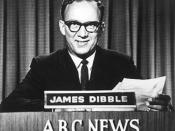This assignment will examine both why and how the Australian Broadcasting Corporation ( ABC ) radio services are different to those of commercial radio. The origins and history of the ABC will be given, as will that of commercial radio in Australia. The reasons the two differ will then be detailed, combining with why these differences existence.
In 1924 the Sykes Committee made recommendations about how broadcasting should be organised in Britain. It suggested that " 'the wavebands available in any country' as a 'valuable form of public property' .... should be operated only in the 'public interest' " ( Cunningham & Turner, 2002: Pg 331 ) These suggestions saw Britain establish broadcasting as a non-commercial monopoly. The United States, however, did not establish broadcasting under the protection of the state. A set of privately owned commercially run organisations were created. ( Streeter, 1996 ) Australia, along with Canada, choose to combine elements of both models, creating a broadcasting service, which saw radio and television feature both a public service and a commercial sector.
( Cunningham & Turner, 2002: Pg 331 )
The ABC and Special Broadcasting Service ( SBS ) gained its origins and principles from the British Broadcasting Corporation ( BBC ), which was founded in the 1920's. ( Cunningham & Turner, 2002: Pg 330 ) The ABC first aired in 1932. It was intended " to draw the country together by bringing radio of special quality, importance and relevance to all Australians. " ( Cunningham & Turner, 2002: Pg 143 )
Public Service Broadcasting ( PSB ), is represented in Australia by the ABC and SBS, and is designed as a 'public service', to provide 'cultural, moral and educative force for the improvement on knowledge, taste and manners'. ( Scannell and Cardiff, 1991: Pg 7 )...


